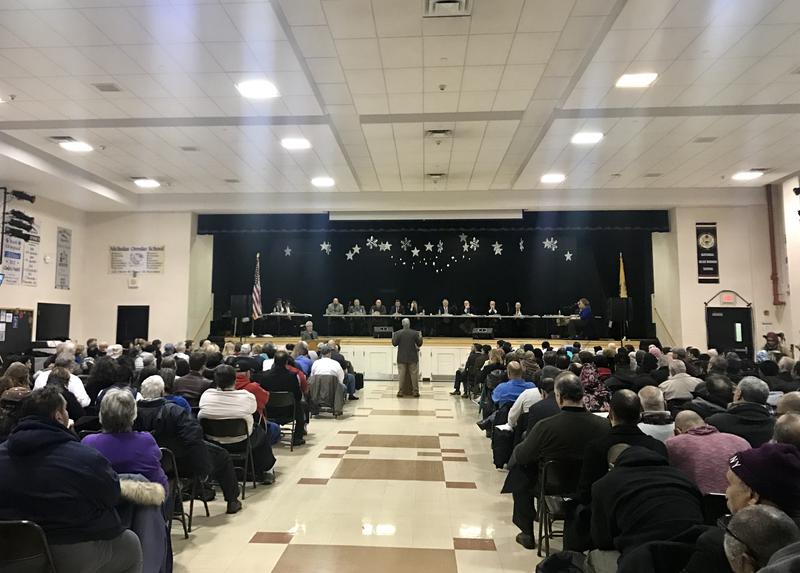
BAYONNE, NJ -- Most of the opponents sat on the right side of the gymnasium at Nicholas Oresko School, named for a native son who was awarded the medal of honor in World War II, 62 years ago to the day.
On the other side of the room sat the supporters, mostly Muslims. Women wore headscarves and men passed around water bottles as the city zoning board listened to testimony for five hours Monday night over whether to allow a property in a residential neighborhood to be converted into a $1.6 million, 23,000-square-foot mosque and community center. The Muslims in this port city across the Hudson River from Brooklyn are seeking variances that would allow them to create fewer parking spaces than required and a smaller buffer between its property and neighbors.
The issue has become so controversial that the meeting was moved from City Hall to the more spacious school gymnasium. Several hundred folding chairs were filled, but the board adjourned just before 11 pm without making a decision. Another meeting will be scheduled at an undetermined date.
Traffic and parking were the chief concerns raised by opponents, who dominated the microphone at the hearing. But there was a distinctly us versus them vibe, like when opponent Joe Wisniewski took the microphone. "Could you ask your audience how many live in Bayonne," Wisniewski said to the zoning board chairman. When the chairman didn't oblige, Wisniewski turned to the crowd to do his own survey: "OK on this side, how many live in Bayonne?"
Wisniewski was ruled out of order, but applauded by those on the opposition side of the room.
Residents raised questions about security and who will monitor the Muslims' comings and goings. Opposition fliers circulating in town have referenced Sept. 11 with the word, "remember." And the presidential inauguration of Donald Trump was not far from anyone’s mind -- someone wore a "Make America Great Again" hat, and there was a brief "Trump! Trump!" chant before the meeting began. The anti-mosque Facebook page opposed to this project also posted a video of Trump calling for the closure of some mosques.
An additional backdrop to the tense meeting: Last month, a 20-year-old who lives in the city pleaded guilty for spray painting the exterior of a closed Catholic school where the Bayonne Muslims now use as a temporary prayer space. The graffiti cursed out Muslims and Allah and added the words "Donald Trump."
Bayonne is one of a several communities across the country dealing with tense controversies involving the construction of mosques. Beginning after the 2010 controversy around the so-called Ground Zero mosque, typically routine zoning approvals for new mosque construction have become far more politicized.
In Fredericksburg, Va., residents were opposed to a mosque for familiar reasons like traffic. But then a video went viral of one opponent standing up at a public meeting and yelling: “Nobody, nobody, nobody wants your evil cult in this county.”
And in Yonkers last year, Muslims tried to turn an old house into a mosque. It was a permitted use, but a group suddenly popped up to apply to the city to protect the house under a historic landmark designation, catching even the property owner unaware. The city council voted to approve the historic designation -- Republicans voted yes, Democrats voted no. The Muslims have since sued, and the matter is now tied up in court.
In the last few years the Obama Justice Department sued cities around the country for denying permits to build mosques, alleging religious discrimination under the pretense of zoning rules.
When Muslims in Basking Ridge, NJ, sought to build a mosque, they were represented by a Muslim-American who had lived in town for decades and once served as mayor. But the group saw its mailbox vandalized with the word "ISIS," and after four years and 39 public hearings they were denied a permit to build. The ostensible opposition was related to traffic and parking concerns, but then the Obama Justice Department got involved. It sued the town, claiming religious discrimination. Through the suit, the department obtained an email from a member of the township committee referring to Islam as a religion based on "forced conversion through violent means." Another referenced blocking the mosque in order to stick up for their "dead residents," presumably a reference to Sept. 11th.
Sure enough, earlier this month a federal judge ruled that the mosque had indeed been improperly denied.
Moving forward, it seems unlikely that other mosque proposals would be similarly protected by a Trump Justice Department. After all, the president has called for the closures of some mosques, and at one point wanted to indefinitely ban Muslims from entering the country. The Bernardsville case could be a good test: If the town appeals the decision, it will be interesting to see what position Trump’s lawyers take in court.
